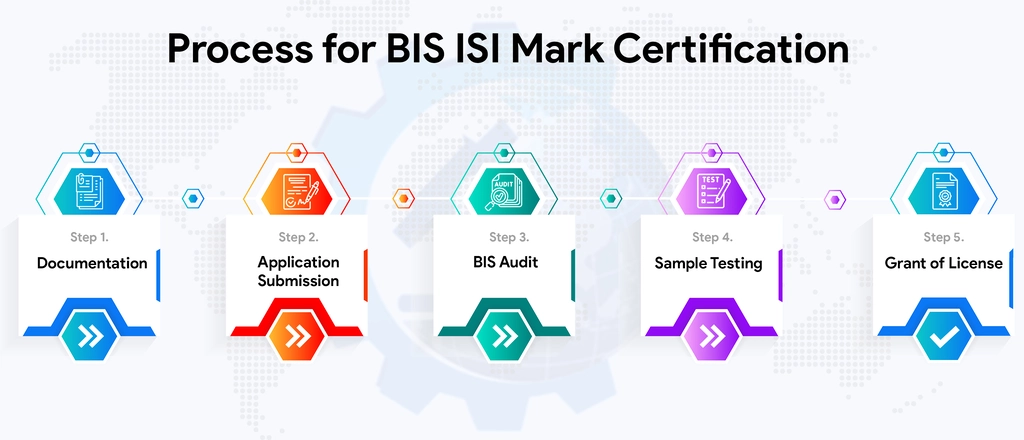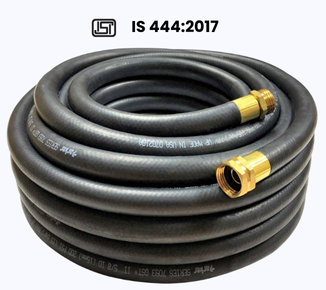BIS CERTIFICATION PROCESS INFORMATION Rubber Hoses, Textile-Reinforced, for General-Purpose Water Applications IS 444
Introduction
Textile material-reinforced rubber hoses are very normally applied to all types of general-purpose water uses, from irrigation systems up to industrial water supply. Assurance of quality and safety in such a hose to a higher degree is very vital with respect to the performance and durability aspects. The Bureau of Indian Standards has laid out the standard of IS 444:2017 for such types of rubber hose. It therefore infers that for such hoses, BIS certification is a must and shall be so required of any manufacturer or supplier who intends to offer such in the Indian market for acceptance, safety, and reliability.
Third-party certification is going to be vital to ensure that the product meets the qualities and safety given. BIS Certification to IS 444:2017 will ensure that the hose is durable, performs to a certain standard, and resists wear and weathering elements. Demands for high-quality water hoses are steadily rising in the agriculture, construction, and industrial sectors. BIS certification provides credence and helps improve the marketability of the product, thus giving them a competitive edge in the market. Product Applications
- Agricultural irrigation systems
- Industrial water supply lines
- Garden hoses
- Construction site water delivery
- Firefighting and other emergency water conveyance
Overview of IS 444:2017
IS 444:2017 specifies the requirements for textile-reinforced rubber hoses for water applications. The standard covers material composition, performance characteristics, dimensions, and safety requirements.
Key Aspects of IS 444:2017
- Material Composition: The hoses must be made from specified grades of rubber, reinforced with textile layers, ensuring flexibility and strength.
- Performance Requirements: The standard outlines minimum burst pressure, flexibility, tensile strength, and temperature resistance, ensuring reliable performance under various conditions.
- Durability and Resistance: The hoses are tested for resistance to abrasion, weathering, and environmental factors such as UV exposure, ensuring a long service life.
- Safety Standards: Compliance with the safety guidelines minimizes risks of hose failure during use, protecting both users and equipment.
Key highlights
| Product Name | Rubber Hoses, Textile-Reinforced, for General-Purpose Water Applications |
| Applicable Indian Standard | IS 444:2017 |
| Applicable Certification Scheme | Product Certification Scheme (ISI Mark Scheme) Scheme 1 |
| Applicable Mark: | BIS Standard Mark (ISI Logo) |
| Compliance Requirement | Mandatory |
| Quality Control Order | Click here |
| Ministry | Ministry of Heavy Industries and Public Enterprises |
| Scope as per Standard | IS 444:2017 covers the requirements for textile-reinforced rubber hoses used in general-purpose water applications, focusing on quality, durability, and safety. |
Applicable Tests
- Material and Construction
- Internal diameters and tolerances
- Concentricity
- Tolerance of length
- Cover
- Minimum thickness of lining and cover
- Rubber compound -Minimum tensile strength
- Rubber compound- Minimum elongation at break
- Resistance to ageing: Change in tensile strength from original value (max) . Change in elongation at break from original value (max)
- Proof pressure at 23 0 C
- Change in length at proof pressure
- Minimum burst pressure
- Adhesion between component
- Flexibility at 23ºC

Note
For Detailed Information about the Procedure for BIS ISI Certification, Visit :
Timeline for BIS Certification
The approximate timeline to obtain BIS certification for Rubber Hoses, Textile-Reinforced, for General-Purpose Water Applications to use the ISI mark as per IS 444:2017 is as follows:
- For Indian Manufacturers (Standard Timeframe – 30 days)
- For Foreign Manufacturers (Standard Timeframe – 180 days)
Benefits of BIS Certification
BIS certification offers several significant benefits:
| Benefit | Description |
|---|---|
| Access to the Indian Market | BIS certification is mandatory for selling rubber hoses in India, ensuring compliance with local regulations and standards |
| Compliance with Indian Standards | Certified hoses meet national safety and quality requirements, providing assurance to buyers and end-users. |
| Enhanced Product Credibility | BIS certification boosts the product’s credibility, which can help in gaining trust from customers and expanding market reach. |
| Increased Customer Trust | Certification guarantees consistent quality, leading to higher customer satisfaction and brand loyalty. |
| Benefits for MSMEs | For small and medium enterprises, BIS certification opens up market opportunities, providing an advantage in offering certified products that meet industry standards. |
Case Studies
A manufacturing firm of rubber hoses wanted to expand its market in the domestic industry by meeting the standard requirements under specification IS 444:2017 represented through BIS. With this certification by BIS, the quality of products improved, along with a significant increase in sales for the company. A certified hose would be identified by a customer as more reliable, with the product conforming to the national standards that penetrate the market well with good brand recognition.
Conclusion
BIS certification of textile-reinforced rubber hoses to IS 444:2017 is indispensable to any manufacturer in pursuit of quality and safety for its products, matching up to Indian standards. This will create a more competitive advantage by enhancing the marketability and building the trust of customers towards business success in the long run. Aleph India plays the vital role of walking manufacturers through the BIS certification process in IS 444:2017 with its expertise in Indian standards, ensuring that products meet all the requirements for success.
For more updates and detailed procedures, stay connected with Aleph INDIA and ensure your products are always compliant and top-quality.
Frequently Asked Questions
International Audits & Participation
Testimonials
BIS REGISTRATION FOR ELECTRONIC & IT PRODUCT
In the era of globalization, world trade is growing rapidly and henceforth, Manufacturing and Import/Export businesses are also growing drastically...View More
BIS CERTIFICATE FOR FOREIGN MANUFACTURER
The Economy of India-the fastest developing economy on the globe with the capabilities that help it matches up with the biggest international...View More
PRODUCT CERTIFICATION SCHEME (ISI MARK) FOR DOMESTIC MANUFACTURERS
Anything a person buys from food to cars, clothes to electronics, branded to unnamed products there is always a question that wanders in one’s...View More
WIRELESS PLANNING AND COORDINATION (WPC)
WPC: Wireless means communication done from one point to another point without the wires and cables. Electromagnetic waves carry the ...View More
BUREAU OF ENERGY EFFICIENCY (BEE) CERTIFICATE
BEE CERTIFICATE: Energy is the future, and its conservation is the way of the bright future. Everyone claims the environment is important...View More
E-WASTE MANAGEMENT
E-waste is one of the world's fastest-growing trash streams. We currently manufacture almost 50 million tones of it each year...View More
View All Services
Request a call back.
Would you like to speak to one of our Senior Technical advisers over the phone? Just submit your details and we’ll be in touch shortly. You can also email us if you would prefer.






























